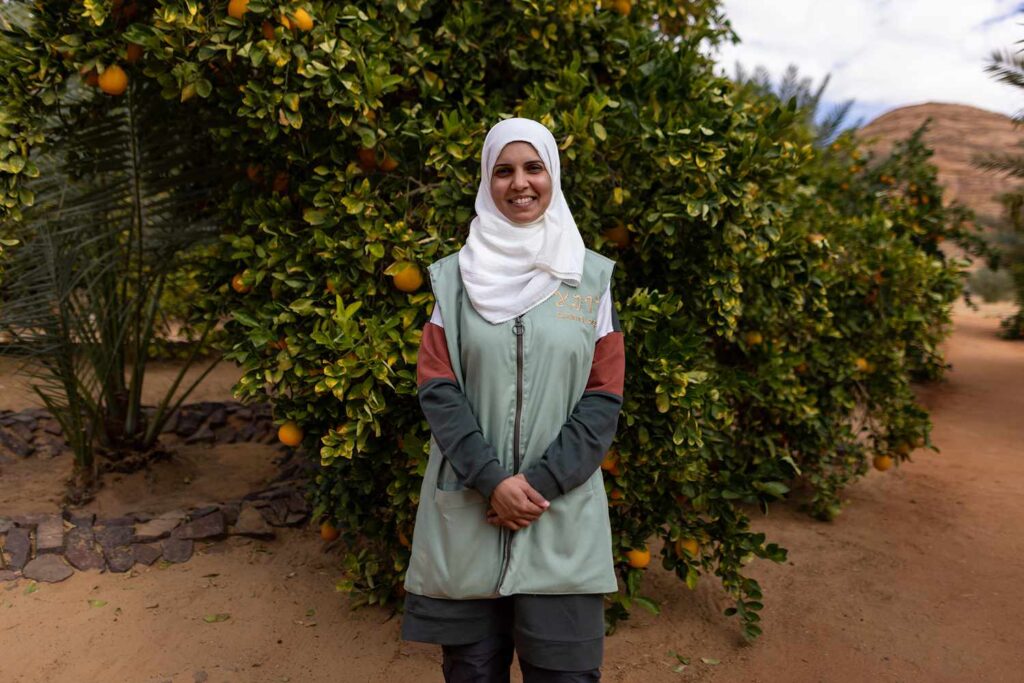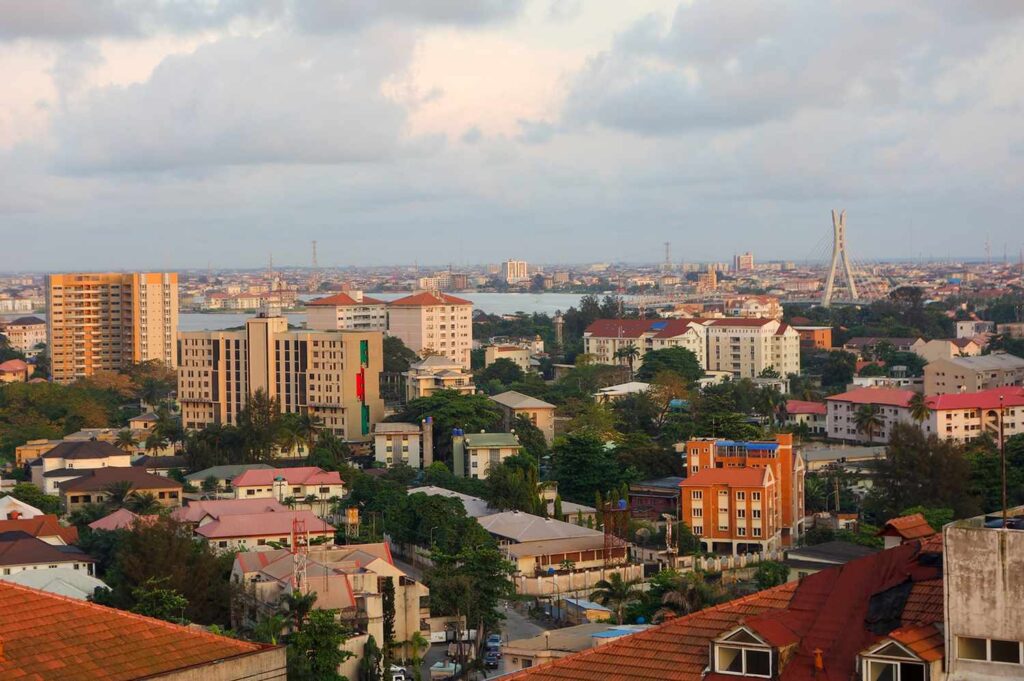:max_bytes(150000):strip_icc():format(jpeg)/TAL-header-aljoud-farm-alula-SAUDILADYCHEFS0924-5d59aa98eca347e6810b928071c84a17.jpg)
In the seven years since Saudi Arabia officially announced Vision 2030, an ambitious economic diversification program aiming to transform the Gulf nation into a global powerhouse, many things have changed. Notably, the country opened up to global tourism in 2019, opening up historical areas like AlUla and even building a sustainability-focused high-end resort area in the Red Sea.
The social impact for women is in the numbers: participation of women in the labor force rose from 19.4 percent pre-Vision to 33.2 percent in 2020, and the number of women-owned small businesses rose from 22 percent pre-Vision to 38 percent in 2020.
One area, in particular, experiencing a cultural revolution is the Saudi culinary world, which is spearheaded by (and for) women, who are opening restaurants, running kitchens, and innovating around nutrition. These women are also at the forefront of preserving Saudi culinary history and traditions.
It all starts from the top.
Saudi Arabia established a Ministry of Culture with 11 individual cultural divisions, including the Culinary Arts Commission, in 2018. And the very first CEO is a woman: Mayada Badr.
Badr represents the top of the food chain of the change for women in the culinary world. She studied at Le Cordon Bleu in Paris before returning to Saudi Arabia in 2012 to open a bakery specializing in macarons, earning her the nickname “Queen of Macarons.” When she got the call to lead the Culinary Arts Commission, she knew there were not only a lot of gaps that needed to be filled for women in the culinary space, but also for Saudi Arabia’s culinary legacy, at large.
Courtesy of Saudi Culinary Arts Commission
Badr told Travel + Leisure that Saudis would hire experts from abroad but wouldn’t be in the culinary space themselves. She credits Vision 2023 for bringing Saudi chefs — and Saudi female chefs — into the scene. “We’re very keen on the wording “Culinary Arts Commission” — it’s not just culinary, it’s an art form,” she said. “Just announcing that culinary would be part of the arts commissions, we elevated the industry.”
Badr says the change to the evolving rules around gender segregation. “Women weren’t really allowed to work with men in certain areas. And now the schools are mixed, we have concerts, and we drive,” she said.
Another component is technology that streamlined government processes like registering businesses and created apps where people can sell everything from home-grown produce to traditional foods and biscuits. “Now you can do everything online. We have one of the best infrastructures for government online,” she said.
Courtesy of Aljoud Farm
One success story is Al Joud Farm in AlUla where a mother-daughter team invites tourists to experience a local farm and take cooking classes. (Here, you can learn to make traditional Saudi dishes like msafat, a layered dish where a hearty tomato-based soup simmering with lamb is spooned between thin slices of unleavened bread. The bread soaks up the soup in an almost lasagna-like consistency. It’s then topped with lamb meat and garnished with lamb fat.) This is just one example of thousands across the country where the Culinary Arts Commission, alongside the local government, empowered women to start businesses by investing in them.
The Culinary Arts Commission is going to great lengths to document and preserve the culinary heritage of Saudi Arabia along the way. For example, it sent researchers to all 13 regions of the country to document recipes and heritage dishes that make up Saudi cuisine. (It declared jareesh and magshoosh the two national dishes of Saudi Arabia.) It’s also raising awareness about all the local dishes by publishing books, producing documentaries, and sending representatives to food events and festivals around the globe.
Courtesy of Saudi Culinary Arts Commission
As for what’s next, Le Cordon Bleu is opening in Riyadh in 2025; the Culinary Arts Commission is offering scholarships for people to get advanced degrees in culinary education abroad; and the Culinary Arts Commission is focusing on innovation and testing Indigenous foods for their health components, opening labs, hiring scientists, and more.
A Pre-Vision Success Story
Enaam Salem Shukr was married at 14 years old and divorced by age 27 with three sons and two daughters. She was always passionate about cooking, a skill she learned from her mother that later became her responsibility as a housewife. After her divorce, cooking became her livelihood. “I wanted to do something because I have a responsibility for me and the kids,” Shukr told T+L.
Since fast food was trendy, she invested in a grill, prepared patties at home, and sold burgers in parks. Her business was so successful she started a food truck in 2013, becoming the first woman to own and operate a food truck in the city. But back then, women weren’t allowed to drive — Saudi Arabia legalized women driving in 2017 — so she recruited her high school son to drive the truck for her.
Paul Feinstein/Travel + Leisure
Shukr’s business took off in 2019, only to face a temporary setback during COVID when she pivoted to delivering barbecue boxes she made at home. In 2021, she opened a standalone burger joint called H Burger, famous for its multi-colored potato buns and creative toppings, like mozzarella sticks.
What’s truly inspiring about Shukr’s story is she received no government support: she’s a success story before Vision 2030. (Per guardianship laws at the time, women needed permission from their father or husband to start a business. Shukr skirted this as a divorcee and because she didn’t have a living father.)
That’s not to say Vision 2030 didn’t help Shukra, as helped her amplify her success. “Before there was no spotlight on women. Now, it’s completely different,” Shukr told T+L. “With the Vision 2030, it was easier for me. I started to drive. I look for events outside of the Kingdom. Before the Vision, I couldn’t travel without permission. After the Vision, we can travel and go to meetings. Companies became mixed, and banks became easier for women to work with. So Vision 2030 opened so many doors for us.”
Meet the Women in Saudi Arabia’s Culinary Scene
Saudi Arabia appears to be on a trajectory that will open opportunities for its entire citizenry. This can truly be seen in the innovative chefs and culinary experts roaming the country today.
There’s Noura AlGhushairy, a clinically trained Stanford University-educated nutritionist whose mission is to consult and teach Saudi society (and the rest of the world) about their culinary history from a nutritional standpoint. She singlehandedly visited every region of the country to help document heritage cuisine. Today, she teaches young women in the culinary world everything from menu development and kitchen operations to management and nutrition. “I want to open this door for other girls and women, I want to empower them and be a mentor to them,” AlGhushairy told T+L.
ROBERT KFOURY/Courtesy of Four Seasons Hotel Riyadh At Kingdom Center
At the Four Seasons Hotel Riyadh at Kingdom Center, the Obaya Lounge on the ground floor is the first and only lounge in the country to be run entirely by women. “And that’s for us an empowerment, our ladies are very proud of working here,” Robert Pupping, the food and beverage manager of the hotel, told T+L.
In AlUla, luxury hotel Dar Tantora The House Hotel opened in the Old Town in 2024 and tapped Maitha Yaseen to be the chef de partie of its fine dining restaurant. “I applied for a scholarship and went to France to study culinary,” Yaseen said. “I started by working at resorts in AlUla and I was the only woman in the kitchen.”
Courtesy of Dar Tantora by The House Hotel
And then there’s Hala Abuonq. Married at 15 and divorced by 35 in 2006, Abuonq needed money to support her and her family. With the help of her brother, she cooked at home for 17 years, selling traditional Medina fried dumplings from her house. Now, she has two restaurants and two cloud kitchens in Riyadh.
“Never in a million years could I have imagined this,” Abuonq said. “When I got divorced, it broke me. But it brought me out. I want to open branches of my business everywhere.”


